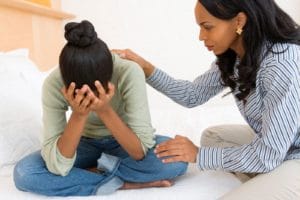Recognizing the warning signs of drug use/abuse in youth isn’t easy. Recognizing those warning signs in our own children is even harder in part because as parents, we don’t let ourselves believe that our children could be struggling. Substance abuse is a serious issue nationwide.
According to reports from the National Council on Alcohol and Drug Dependency the overall costs of substance abuse in the United States, including productivity and health- and crime-related costs, is estimated to exceed $600 billion annually. This includes approximately $193 billion for illicit drugs, $193 billion for tobacco, and $235 billion for alcohol. The numbers are shocking. Include the nearly immeasurable extended community costs such as unemployment, school dropout rates, domestic violence and child abuse, and the size of the problem is unimaginable.
While there are numerous reasons a child may try drugs and alcohol, it’s important to know that one of those reasons could be an underlying struggle with mental health. It is not unusual for adults and adolescents alike to self-medicate with drugs and/or alcohol to numb or ignore their feelings.
If your child were struggling with addiction, you would want to get them immediate help. But would you know if your child was struggling? Could you recognize the signs? Below are three major types of changes that could indicate that your child may be using or abusing drugs or alcohol.
Be Aware of These Three Types of Warning Signs
Behavior Changes
According to an article published in Innovations in Clinical Neuroscience, “one of the earliest warning signs that predicts teenage drug use is a change in behavior and mannerism.” Other behavioral changes could include:
- Skipping class, declining grades, getting in trouble at school
- Missing money or valuables from the home, missing prescription drugs
- Clashes with family values and beliefs
- Preoccupation with alcohol and drug-related lifestyle in music, clothing and posters
- Demanding more privacy, locking doors and avoiding eye contact
- Sudden change in relationships, friends, favorite hangouts, and hobbies
- Using incense, perfume, or air freshener frequently (to hide the smell of smoke or drugs)
- Using eye drops to mask bloodshot eyes and dilated pupils
Mood Changes
Some teenagers who abuse drugs may become more irrational or dramatic in their actions. You may notice your child becoming more irritable, verbally abusive, or even violent with you or other children in the household. Additionally, your child may begin to threaten to drop out of school, run away from home, or destroy property. In addition, depression, mood instability, and apathy are also warning signs of potential drug abuse and shouldn’t be taken lightly. Other mood changes to be aware of include:
- Unexplained, confusing change in personality and/or attitude
- Sudden mood changes, irritability, angry outbursts or laughing at nothing
- Periods of unusual hyperactivity or agitation
- Lack of motivation and/or an inability to focus
- Appears fearful, withdrawn, anxious, or paranoid, with no apparent reason
Physical Changes
Drug use takes a physical toll on the body, and that the visible signs of that toll are plentiful and varied. Some physical changes that could indicate drug or alcohol use or abuse include:
- Bloodshot eyes
- Widely dilated pupils
- Sudden weight loss (or weight gain)
- Poor hygiene
- Frequent nosebleeds
- Shakes or tremors
- Red, flushed cheeks
- Bruises or other unexplained injuries
- Drowsiness or fatigue
- Changes in appetite or sleep patterns
- Unusual smells on breath, body, or clothing
- Incoherent or slurred speech
These warning signs do not always indicate drug use. However, if you see any of these warning signs in your child, don’t sweep it under the rug and hope it goes away. The best thing you can do for your child is to seek help from a trained professional. You can start by taking your child to your family physician to screen for signs of drug use and other related health conditions. You can also contact an addiction specialist directly. The American Society of Addiction Medicine has a Find a Physician feature on its home page. You and the physician can decide if your child should be referred to treatment.
You and the physician can decide if your child should be referred to treatment.
It takes a lot of courage to seek help for a child with a possible drug problem. However, your courage will pay off because treatment works, and children can recover from addiction. You want to be sure your child is healthy before venturing into the world with more independence and where drugs are more easily available.
For hope and healing,
Mike Hannan
Sources:
https://www.palmerlakerecovery.com/blog/signs-of-drug-abuse-in-teenagers/
https://www.ncadd.org/about-addiction/signs-and-symptoms/what-to-look-for-signs-and-symptoms
https://www.ncbi.nlm.nih.gov/pmc/articles/PMC3257983/
https://www.drugabuse.gov/related-topics/treatment/what-to-do-if-your-teen-or-young-adult-has-problem-drugs










